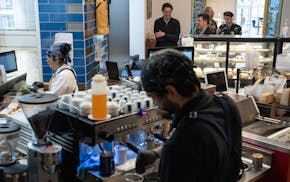Under President Donald Trump's broad and far-reaching new tariffs, Minnesotans will have a hard time avoiding higher prices.
If the tariffs go into effect as planned, that is.
But the import tax on Chinese goods has risen to 125% in a back-and-forth tariff spat. And a new 10% baseline tariff on nearly all imports also remains in effect — reducing, for now, the 25% tariffs imposed on Mexico and Canada last month.
Last year, the state imported $40 billion worth of goods. All of that oil, machinery, toys, vehicles, medical devices and more will face the 10% tariff that started Saturday.
Higher rates targeting dozens of countries briefly went into effect Wednesday, including ranging from 24% on the European Union, 32% on crucial semiconductor manufacturer Taiwan and 47% on vanilla exporter Madagascar.
The new rate on Chinese imports more than doubles the cost of products from China. The U.S. imported $439 billion worth of goods from China last year.
Tariffs are an import tax, meaning the importers — the companies bringing goods across the border — pay the price.
Historically, almost 100% of the cost of tariffs pass on to businesses and consumers and are not paid by exporters, according to the National Bureau of Economic Research. This is why opponents decry tariffs as a sales tax.
Prices for domestically produced goods also tend to rise with tariffs increasing the costs of rival imports.
"The more interesting, and in some ways insidious, function these tariffs play is they set up domestic producers of competitive products to raise prices in tandem with tariffs," said University of Minnesota professor and trade policy expert C. Ford Runge.
Under the original "reciprocal" tariff plan, the average tariff rate would be at its highest level in more than a century. The long-term benefit of such a policy is to boost manufacturing in the U.S., which can take many years.
Tariffs on Minnesota's largest trading partners will mean higher prices for electronics and apparel imported from China, fruits and vegetables from Mexico and lumber and auto parts from Canada.
Minnesota and many Midwest states depend on Canadian oil for gasoline. Gas prices have risen 5% in Minnesota since Canadian tariffs started in March following an initial pause, according to GasBuddy.
Thousands of corporate executives said they expect to pass along at least half of tariff costs as price increases, according to a survey by EY-Parthenon.
Wedbush analyst Dan Ives called the new tariffs "worse than the worst-case scenario" Wall Street was bracing for. Major stock indexes have plummeted on fears of higher prices slowing consumer spending and economic growth before rising sharply Wednesday on the pause.
The Federal Reserve Bank of Richmond projected tariff-related price increases will hit Midwestern states the hardest.
"Ultimately, the proposed tariffs may raise input costs, disrupt supply chains and result in higher consumer prices, potentially outweighing any targeted employment gains in protected industries," the bank concluded.
What would be the most immediate impacts of the tariffs?
Most of the oil refined into gasoline in Minnesota comes from Canada, the state's largest trading partner. General Mills sources many of its oats for the nation's top-selling cereal, Cheerios, from the country. And companies involved in the auto industry have a strong relationship with Canadian firms, as does the Iron Range ore industry.
The most immediate impacts of tariffs will be on food, fashion and electronics, said Neil Saunders, managing director at GlobalData.
"Retailers will take a multi-pronged approach. They will try to reduce costs in their supply chain and wider operations, they will absorb some of the cost, and they will pass some across to consumers," Saunders said. "Low-margin sectors, which include food and electronics, will feel the pinch more than most as margins are not robust enough to absorb all of the increase."
After historic grocery inflation finally cooled off to average levels, higher grocery bills might be on the horizon.
The Consumer Brands Association — which counts Minnesota companies like General Mills, Hormel Foods, Land O'Lakes and Target among its members — said in a statement tariffs "could lead to higher consumer prices and retaliation against U.S. exporters."
"There are critical ingredients and inputs that need to be imported due to scarce availability domestically. No amount of tariffs will bring these inputs back to the U.S.," the group said last week. "We encourage President Trump and his trade advisors to fine-tune their approach and exempt key ingredients and inputs in order to protect manufacturing jobs and prevent unnecessary inflation at the grocery store."
It could be months before certain goods see price increases. Best Buy has about six weeks of inventory for many items, on average. Some stores will raise prices incrementally to prevent a sudden spike, experts say.
The more shoppers try to get ahead of the tariff price increases by making big-ticket purchases now, the sooner prices will rise as existing inventories are depleted and more imports arrive.
Why Canada?
The Canadian tariffs are meant to "address the flow of illicit drugs across our northern border," according to President Donald Trump's executive order initiating tariffs. Trump was specifically speaking about fentanyl.
He gave the same rationale, plus illegal immigration, for Mexican tariffs.
The White House has reduced tariffs on potash, an essential fertilizer ingredient, since it first introduced them.
A bill to undo tariffs on Canada recently passed the U.S. Senate with Republican support. Its fate in the House is uncertain.
What is Minnesota's trade relationship with Canada, Mexico and China?
Canada and Mexico are Minnesota's top trading partners, with China third. Combined, the state imports far more than it exports to those countries.
In 2023, Minnesota imported $14.1 billion worth of goods from Canada and exported $7 billion, according to census data. Oil is the largest share of Canadian imports.
The state imported $3.3 billion from Mexico, roughly the same level as Minnesota exported to the country in 2023.
Minnesota's annual imports from China through November 2024 reached $6 billion. The state exported $2.4 billion to China in 2023.
What are the energy impacts?
Trump's 10% tariff on Canadian energy could hit Minnesota particularly hard, since the state relies on imports of oil, natural gas and electricity from its northern neighbor.
The Canadian tariffs "would be passed on as a 10% tax to Minnesota consumers," said Peter Wyckoff, a Minnesota Department of Commerce deputy commissioner who oversees energy.
The state's two oil refineries — Marathon Petroleum in St. Paul Park and Flint Hills in Rosemount — receive most of their crude oil from Canada, as does the Cenovus refinery in Superior, Wis. Together, those three refineries provide much of Minnesota's gasoline.
Minnesota is the main portal for much Canadian crude oil flowing into this country. The Enbridge corridor of pipelines running through northern Minnesota transports oil to refineries throughout the Midwest and to the Gulf Coast.
"Instead of a trade war, we should be working to advance North America as an energy powerhouse," Calgary-based Enbridge said in a statement.
How are Minnesota manufacturers responding?
In February, Busy Baby founder Beth Fynbo Benike in Oronoco was awaiting a cargo ship of goods from China subjected to the 10% tariff.
Then the tariffs on China increased, and increased again, and Fynbo Benike now says she'll have to leave $160,000 worth of silicone baby mats in China.
"I am leaving them there because I simply cannot afford to ship them here," she said on social media this week. "I am terrified for my business and for all the small businesses in the United States. "
The dilemma prompted Fynbo Benike to write Trump with a request to instead impose tariffs based on volume so he doesn't "crush little companies."
"We are not iPhone," Fynbo Benike said. "We do maybe six [small] container shipments a year."
Industrial manufacturers are also bracing for impact. Delkor Systems makes and ships about $100 million of robotic packaging machines from its Arden Hills factory each year. About 10% to 15% of that goes north or south of the border.
As a result, Delkor CEO Dale Andersen said last month he was "quite concerned" about his company's future opportunities.
"We're building several machines right now for Canada," he said. "If all of a sudden our customers had to pay a 25% tariff, then they would have to buy equipment from some other country.
"But a lot of people I've talked to, [including] a few of the other owners of machinery businesses for packaging, we all sort of feel that this is sort of a negotiation ploy. No one I've really talked to thinks that this is going to last for more than maybe a month or two."
This story includes reporting from the Associated Press and staff writers Carson Hartzog, Patrick Kennedy, Dee DePass, Christopher Vondracek, Kim Hyatt and Mike Hughlett.

Why now might be the best time to make a deal on boats, ATVs and other powersports

To reset downtown Minneapolis skyway life, building owners cut deals with retailers

Ramstad: AI is English-centric, but it's picking up Hmong quickly
Don't throw away perks that come with insurance and memberships
